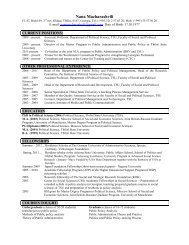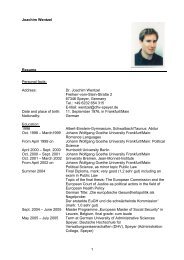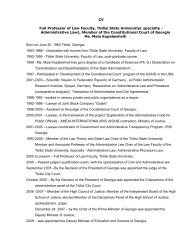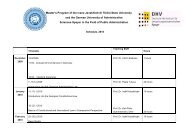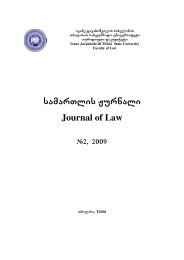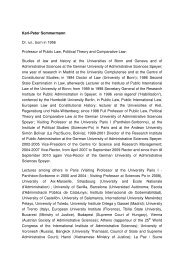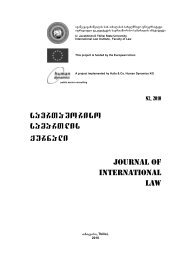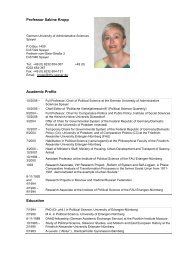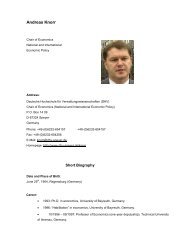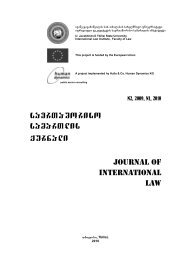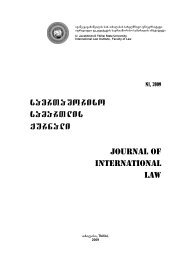Untitled
Untitled
Untitled
Create successful ePaper yourself
Turn your PDF publications into a flip-book with our unique Google optimized e-Paper software.
saerTaSoriso samarTlis Jurnali, #1, 2008 JOURNAL OF INTERNATIONAL LAW, N1, 2008<br />
over these offenders for commission of international<br />
crimes<br />
In order to answer the main question this<br />
essay poses and to understand in depth the<br />
legitimacy of a quest to rescind an absolute<br />
immunity from criminal prosecution of the highest<br />
level state officials, it is important to briefly<br />
analyze a concept of state immunity and development<br />
of a notion of individual criminal<br />
responsibility (of high ranking state officials).<br />
Analyzing the universal jurisdiction in international<br />
law and contrasting a possibility of abolishing<br />
immunities to exercise universal jurisdiction<br />
over perpetrators of international<br />
crimes with the recently introduced conception<br />
of humanitarian intervention for protection<br />
of human rights – conclusion will be drawn<br />
in relation to feasibility of establishment of<br />
state practice and respective norms of international<br />
human rights law to subject the highest<br />
representatives of sovereign states to universal<br />
jurisdiction, and thus grant domestic<br />
courts of any nation possibility to prosecute<br />
high ranking state officials protected by immunities<br />
when perpetrating international<br />
crimes. Interrelation of immunities, a principle<br />
of sovereign equality of states and a problem<br />
of protection of human beings from international<br />
crimes will also be discussed. The main<br />
argument the essay tries to develop is that<br />
the initiatives similar to the Belgian law concerning<br />
The Punishment of Grave Breaches<br />
of International Humanitarian Law 13 must be<br />
supported in this sense.<br />
The following Chapter will discuss development<br />
of a concept of sovereign immunity,<br />
and will show that at the current stage of development<br />
of human rights law protection of<br />
immunities and sovereign equality of states is<br />
not valued more than prosecution of grave<br />
human rights violations, constituting international<br />
crimes. Chapter III will discuss development<br />
of attributing individual criminal responsibility<br />
to criminal leaders for grave international<br />
crimes and Chapter IV will introduce an<br />
idea of humanitarian intervention when gross<br />
human rights violations take place in a country.<br />
This topic is interesting for the purposes<br />
of the Essay as the lack of case law in relation<br />
to the theme of this work calls for drawing analogies<br />
with other attempts to protect human<br />
beings from mass atrocities and for that compromising<br />
even state sovereignty. Chapter V<br />
introduces the case of Pinochet as a groundbreaking<br />
case in relation to protection of immunities<br />
and prosecution of criminal leaders<br />
of states.<br />
It is important to underline at this stage<br />
that despite realizing importance attached to<br />
different types of immunities 14 , for the purposes<br />
of this essay immunities afforded to high<br />
level state officials will be regarded as a one,<br />
unified concept, which helps the high ranking<br />
perpetrators of international crimes to escape<br />
criminal responsibility. Thus, appreciating differences<br />
between immunity ratione materiae<br />
and immunity ratione personae the essay will<br />
not concentrate on these differences and the<br />
importance attached to them 15 . This is due to<br />
the limited format of the essay and also due<br />
to the fact that if the matter is discussed from<br />
the victims’ perspective, there is too little a difference<br />
for victims of human rights atrocities,<br />
whether a person responsible for grave international<br />
crimes was covered by immunity “a”<br />
or immunity “b”. What is important for victims<br />
is that a “well-protected” 16 high level official is<br />
responsible for the crime, and he/she can escape<br />
this responsibility due to the well-configured<br />
immunities afforded to him/her. The essay<br />
will also not consider responsibility of criminal<br />
leaders for relatively minor crimes – or<br />
those which fall outside the scope of definition<br />
of international crimes 17 . Thus, the interest of<br />
the essay is to consider the relationship of any<br />
type of immunity that can possibly be argued<br />
by criminal leaders of states, with their criminal<br />
responsibility for international crimes.<br />
II. PROTECTION OF IMMUNITIES AND<br />
SOVEREIGN EQUALITY OF STATES 18 :<br />
WHY SHALL THIS MATTER MORE<br />
THAN PROTECTION OF HUMAN<br />
BEINGSFROM ATROCITIES<br />
“If the doctrine of sovereignty could be<br />
erased from the minds of political leaders,<br />
would it reduce those forms of human suffering<br />
associated with extreme governmental failure<br />
Would such an erasure strengthen sentiments<br />
of human solidarity on which an ethos<br />
of collective responsibility and individual accountability<br />
depends” 19 This is a fundamental<br />
question Richard Falk put in his essay. The<br />
questions, this Chapter poses in relation to<br />
the same issues, are the following: Can protection<br />
of human beings from atrocities be<br />
considered as having more value than protec-<br />
66



